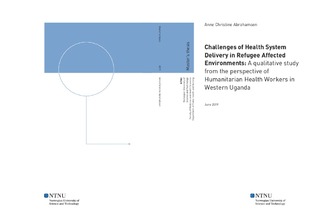| dc.description.abstract | Abstract
Background: The number of forcibly displaced people is on the rise globally and have increased for the 6th year in row. Unable to meet their own needs, Uganda is the largest host country in Africa and are currently hosting 1.2 million refugees. United Nations High Commissioner for refugees (UNHCR), the Government and various partners are working together though an integrated strategy, providing social services to both refugees and the host population in Uganda. The refugee hosting areas is providing support beyond capacity affected by underlying factors as under funding, poverty and limited resources. The enormous pressure is affecting the health service delivery as well as the health workers are working in a challenging, overstrained and unstable context, unable to meet the populations need. Identifying the challenges and gaps in the refugee affected environments is a step towards addressing better solutions.
Purpose: The purpose of the study is to explore, identify gaps and challenges, and understand the health service delivery in the refugee affected environments in western Uganda.
Design and methods: The qualitative study represents 63 semi-structured interviews of national humanitarian health workers conducted in the district of Kyegegwa, Hoima, Arua and Bidi Bidi, west Uganda. Malteruds Systematic Text Condensation (STC) and NVivo software were used to analyse the data.
Results: Exploring the gaps and challenges of the health service delivery from the health workers’ perspective, five main themes are identified 1) Gaps and challenges at the health facilities, 2) Community factors, 3) The situation of health workers, 4) Management and 5) Inequalities between health workers and between refugees and hosts.
Conclusion: The study indicates a big gap in the health service delivery in refugee affected environments in western Uganda. Better funding mechanisms and access to health services for both refugees and hosts should be addressed. The study provides new insight about the situation of the national humanitarian health workers, suggesting more attention to the difficult situation and the unfair treatment of health workers. The study identifies gaps and challenges, and further research should focus on addressing the gaps and finding sustainable solutions.
Keywords: Health service delivery, Refugee affected environment, National humanitarian health workers, West Uganda | |
